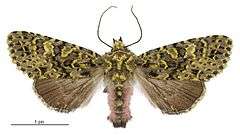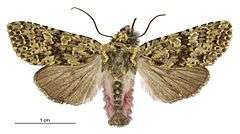Meterana pictula
Meterana pictula is a moth of the family Noctuidae. It is endemic to New Zealand. This species has been classified as "At Risk, Declining" by the Department of Conservation.
| Meterana pictula | |
|---|---|
 | |
| Female | |
 | |
| Male | |
| Scientific classification | |
| Kingdom: | |
| Phylum: | |
| Class: | |
| Order: | |
| Family: | |
| Genus: | |
| Species: | M. pictula |
| Binomial name | |
| Meterana pictula (Taylor, 1855)[1] | |
| Synonyms | |
| |
Taxonomy
This species was first described in Richard Taylor's book Te Ika a Maui: or, New Zealand and its inhabitants in 1855.[2][3] The species name, Dianthoecia pictula, was listed as a caption on the plate that illustrated the moth. Adam White was regarded as the artist of that plate and, as a result, the species authorship has been attributed to him. However Taylor does not mention White and therefore under the International Code of Zoological Nomenclature Article 50.1.1 Taylor should be attributed as the author of the species.[4] In 1887 Edward Meyrick, thinking he was describing a new species, named this moth Mamestra rhodopleura.[5][6] In 1898 and in 1928 George Vernon Hudson discussed and illustrated this moth under the name Melanchra rhodopleura.[7][8]
The holotype specimen of this species has not been located.[5]
Description
The larvae of this species measure approximately 38mm long and are bright coloured with a green base colour and red, yellow and white lines.[9] Hudson described the adult moths of this species as follows:
The expansion of the wings is about 1 1⁄2 inches. The forewings are dark greyish-green with very numerous yellow and black markings, the stigmata and transverse lines being clearly marked by chains of bright yellow and black spots. The hind wings are dark grey, the cilia are also grey with a series of minute yellow dots. The sides of the abdomen are bright crimson.[8]
The adult moths lack the prominent white reniform markings of the South Island species M. meyricci.[9]
Distribution
This species is endemic to New Zealand.[10][11] It has occurred in Bay of Plenty, Hawkes Bay, Taupo, Wellington, Nelson and Fiordland.[12][13]
Live cycle and behaviour
The pupa of this species exists in a cocoon that resides underneath the ground.[8] This moth is a summer emerging species.[14] The adult are on the wing in January but can be seen as late as June.[8] Adults of the species are attracted to sugar.[8]
Host species and habitat
The host species for this nocturnal moth are the New Zealand native mat forming and shrubby Pimelea species.[3] M. pictula prefers coastal and alpine open habitats.[9] It can be found in the North Island in coastal, montane, and alpine shrub-land habitat but only in coastal shrub-lands in the South Island.[9]
Conservation status
M. pictula is classified as being "At Risk" and "Declining" by the Department of Conservation threat classification system.[12][15]
References
- Hoare, R. J. B. (2017). "Noctuinae (Insecta: Lepidoptera: Noctuidae) part 1: Austramathes, Cosmodes, Proteuxoa, Physetica" (PDF). Fauna of New Zealand. 73. doi:10.7931/J2/FNZ.73. Retrieved 10 July 2017.
- Taylor, Richard (1855). Te Ika a Maui: or, New Zealand and its inhabitants. London: Wertheim and Macintosh. pp. xiii, Plate 1.
- Patrick, B. H.; Dugdale, J. S. (2000). "Conservation status of the New Zealand Lepidoptera" (PDF). Science for Conservation. Department of Conservation, New Zealand. 136: 27. ISSN 1173-2946. Archived from the original (PDF) on 2017-05-01. Retrieved 2017-07-08.
- Hoare, R. J. B. (22 June 2017). "Noctuinae (Insecta: Lepidoptera: Noctuidae) part 1: Austramathes, Cosmodes, Proteuxoa, Physetica" (PDF). Fauna of New Zealand. 73: 11. doi:10.7931/J2/FNZ.73 – via Landcare Research New Zealand Ltd.
- Dugdale, J. S. (1988). "Lepidoptera – annotated catalogue, and keys to family-group taxa" (PDF). Fauna of New Zealand. 14: 180. Retrieved 9 May 2018.
- Meyrick, Edward (1887). "Monograph of New Zealand Noctuina". Transactions and Proceedings of the New Zealand Institute. 19: 3–40 – via Biodiversity Heritage Library.
- Hudson, G. V. (1898). New Zealand moths and butterflies (macro-lepidoptera). London: Newman & Co. p. 19. doi:10.5962/bhl.title.7912.
- Hudson, G. V. (1928). The butterflies and moths of New Zealand. Wellington: Ferguson & Osborn. p. 63.
- McGuinness, CA. "The conservation requirements of New Zealands nationally threatened Invertebrates" (PDF). www.doc.govt.nz. Department of Conservation, New Zealand. Retrieved 12 May 2018.
- Research, Landcare. "Meterana pictula (White, 1855)". www.nzor.org.nz. Retrieved 2017-07-08.
- Gordon, Dennis P., ed. (2010). New Zealand inventory of biodiversity. Volume two. Kingdom animalia : chaetognatha, ecdysozoa, ichnofossils. Vol. 2. Christchurch, N.Z.: Canterbury University Press. p. 461. ISBN 9781877257933. OCLC 973607714.
- Keesing, Dr Vaughan (6 May 2013). "APPENDIX XV". Ecological Review of the Terrestrial Ecological AEE Prepared for the Hawke’s Bay Regional Council Ruataniwha Water Storage Project (PDF) (Report). New Zealand: Boffa Miskell LTD. pp. 100 & 131. Retrieved 8 July 2017.
- Patrick, Brian; Dugdale, John S. (2000). Conservation status of the New Zealand lepidoptera (PDF). Wellington, N.Z.: Department of Conservation, New Zealand. p. 27. ISBN 0478218672. OCLC 154670803. Archived from the original (PDF) on 2017-05-01. Retrieved 2018-05-12.
- Patrick, Brian (2014). "Winter-emerging moths of New Zealand". The Weta. 48: 8–14.
- Hoare, R.J.B.; Dugdale, J.S.; Edwards, E.D.; Gibbs, G.W.; Patrick, B.H.; Hitchmough, R.A.; Rolfe, J.R. (2017). "Conservation status of New Zealand butterflies and moths (Lepidoptera), 2015" (PDF). New Zealand Threat Classification Series. 20: 7.
External links
| Wikimedia Commons has media related to Meterana pictula. |
| Wikispecies has information related to Meterana pictula |